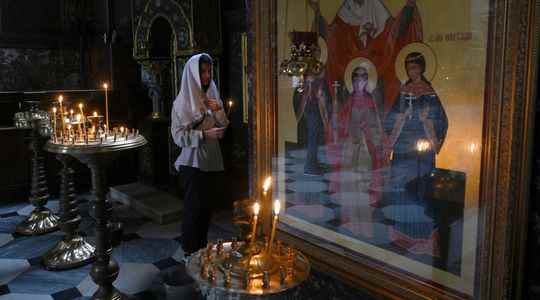Complicated, if not non-existent, since the outbreak of the invasion of Ukraine by Russia, relations between the Ukrainian Orthodox Church and the Moscow Patriarchate are entering a new critical phase. Following a council devoted to Russian aggression, the Church of Ukraine proclaimed, on Friday, May 27, its independence vis-à-vis the spiritual authority of Moscow. Professor at the University of Lorraine and specialist in the cultural and religious history of Russia, Antoine Nivière sees, in this decision, an emancipation from the ideological supervision imposed by Kirill, primate of the Russian Orthodox Church since 2009. Interview.
L’Express: How to interpret the self-proclaimed independence of the Ukrainian Orthodox Church?
Antoine Niviere: It must first be remembered that the Ukrainian Orthodox Church has been divided since 2019, and the recognition of the independence of one of its branches by the Patriarch of Constantinople. This Friday, it is therefore the traditionalist party, hitherto faithful to Moscow, which announces that it is distancing itself from Russia.
His goal is to emancipate himself from the patriarch Kirill, a declared ally of Vladimir Putin in the war. But in legal terms, the Moscow branch of the Orthodox Church of Ukraine does not use the term “autocephalous” which, in Orthodox canon law, means that one is fully independent. By interpreting the statement correctly, we can therefore say that the Ukrainian Orthodox Church wants, to this day, to manage itself without breaking completely with Moscow.
Did the warlike declarations of the patriarch Kirill get the better of his loyalty?
Kirill has never called for peace, never denounced the murders of civilians or the suffering of the Ukrainians, who nevertheless constitute part of his flock. This is intolerable for the Ukrainian Orthodox Church. Moreover, since his appointment in 2009, he has reimposed Moscow’s authority over Kyiv, while the Ukrainian Church has enjoyed self-governing status since 1992.
He has a very vertical view of power, orders come from above and money comes from below. For example, Ukrainian priests must mention his name during services, which many now refuse to do. The will to denounce the speech of Kirill is for a lot in this declaration of independence.
Is this a blow for Russia?
We must first see how the Ukrainian dioceses close to Moscow will react and what freedoms will be available to those located in the territories now occupied by the Russian army. The loss of the Ukrainian dioceses would of course constitute a cost for Russia, both financial and sociological, since the Russian Orthodox Church would lose millions of faithful. Russia considers that the Church of Ukraine is affiliated to it and that it alone can decide on its independence. Kirill had also promised Putin that Russia would keep spiritual control of Ukraine, which he failed to do.
Will two independent churches cohabit on Ukrainian territory?
This declaration of the Ukrainian Orthodox Church is only a first step in a process of evolution, in no case does it constitute a final stage. We must be attentive to the next steps, but it is clear that the cohabitation of these two independent Churches is not easy. Their respective representatives announced that negotiations were going to be initiated, but we can clearly sense that the hitherto Moscow branch of the Ukrainian Orthodox Church feels more legitimate to hold authority and considers that it is up to the other to make concessions.
